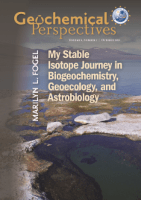
Geochemical Perspectives
Scope & Guideline
Advancing Knowledge in Geochemistry and Beyond.
Introduction
Aims and Scopes
- Geochemical Cycles and Processes:
The journal extensively covers the fundamental geochemical cycles, such as carbon, sulfur, and noble gases, and their interactions with biological processes and environmental changes. - Biogeochemistry:
A significant focus is placed on biogeochemical processes, particularly how biological activity influences and is influenced by geochemical factors. This includes studies on anoxia-related biogeochemistry and the sulfur biogeochemical cycle. - Mineral Exploration and Metallogeny:
The journal also includes discussions on metallogeny and mineral exploration, providing insights into the geological history and the processes that lead to the formation of mineral deposits. - Historical and Personal Perspectives:
'Geochemical Perspectives' often features personal reminiscences and historical accounts from notable figures in geochemistry, enriching the narrative of the discipline's development. - Geobiology:
The exploration of geobiology is a core area, examining the interactions between the Earth's biosphere and geological processes, underscoring the importance of life in shaping geochemical environments.
Trending and Emerging
- Carbon Capture and Storage:
Recent publications have increasingly addressed global solutions for carbon capture and storage, highlighting the urgency of climate change and the role of geochemistry in mitigating its effects. - Noble Gas Cosmochemistry:
The exploration of noble gases in cosmochemistry has gained attention, reflecting advancements in understanding the origins of planetary bodies and geochemical processes over geological timescales. - Anoxia and Marine Biogeochemistry:
Research on anoxia-related biogeochemistry in marine environments has emerged as a significant theme, emphasizing the impact of oxygen levels on marine ecosystems and sediment geochemistry. - Geobiological Interactions:
There is a growing interest in the interactions between geological and biological processes, with an emphasis on how these relationships influence Earth's systems, indicating a trend towards integrated research approaches.
Declining or Waning
- Thermodynamics and Kinetics in Geochemistry:
While thermodynamics and kinetics are fundamental concepts in geochemistry, their specific applications in papers have decreased, suggesting a shift towards more applied or interdisciplinary themes rather than purely theoretical discussions. - Historical Biographies and Reminiscences:
The number of articles focusing on historical perspectives and personal reminiscences, while still present, appears to be waning, indicating a potential move towards contemporary research topics rather than historical narratives. - General Geochemical Theory:
There seems to be a gradual decline in publications that focus solely on general geochemical theories without specific applications or case studies, as the journal appears to favor more applied and interdisciplinary research.
Similar Journals
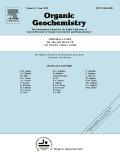
ORGANIC GEOCHEMISTRY
Charting New Territories in Organic GeochemistryORGANIC GEOCHEMISTRY, published by PERGAMON-ELSEVIER SCIENCE LTD, is a pivotal journal in the field of geochemistry and petrology, dedicated to the exploration of organic compounds and their interactions within geological systems. Established in 1977, this journal has been an influential medium for researchers, providing significant insights and advancements that have shaped the understanding of organic geochemistry. With an impressive impact factor and a distinguished ranking of Q2 in its category, it sits at the forefront of academic research, currently holding the 46th position out of 154 in Earth and Planetary Sciences according to Scopus, which places it within the top 70th percentile. Although it operates on a subscription basis, ORGANIC GEOCHEMISTRY is recognized for its rigorous peer-review process, ensuring that only the highest quality research is published. Its scope includes an array of critical topics, appealing to geochemists, petrologists, students, and professionals looking to deepen their knowledge and contribute to this dynamic field. With converged publications extending into 2024, the journal continues to play a crucial role in the dissemination of cutting-edge research that addresses global challenges such as environmental change and resource management.

China Geology
Advancing Knowledge in Geology and BeyondChina Geology, published by KEAI PUBLISHING LTD, is a leading open-access journal that serves as a pivotal platform for disseminating high-quality research across a wide spectrum of Earth sciences. Since its inception in 2018, the journal has rapidly established itself with an impressive Q1 ranking in multiple critical categories, including Geology, Economic Geology, and Oceanography, among others, reflecting its significant contribution to the academic community. Positioned as a top-tier journal in the Earth Planetary Sciences domain, it ranks #22 out of 321 in Geology and exhibits an admirable impact in sub-fields such as Earth-Surface Processes and Geochemistry and Petrology. China Geology is committed to promoting rigorous scientific inquiry and facilitating the open exchange of knowledge in the geosciences, making it an essential resource for researchers, professionals, and students eager to explore innovative developments and fundamental advances in geology. The journal’s accessibility ensures that critical findings reach a broad audience, thereby enhancing collaboration and driving forward scientific discourse in the global community.
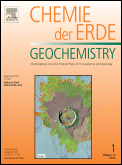
Geochemistry
Unraveling the Complexity of Earth SystemsGeochemistry is a distinguished academic journal published by Elsevier GmbH, focusing on the intricate study of geochemical processes across earth systems. With its ISSN 0009-2819 and E-ISSN 1611-5864, this journal serves as a crucial platform for scholars and researchers eager to disseminate their latest findings in geochemistry, petrology, and geophysics. The journal has established itself within the scientific community, achieving a Q2 ranking in both Geochemistry and Petrology as well as Geophysics, showcasing its significant impact and relevance—ranking 18th out of 165 in Geophysics and 26th out of 154 in Geochemistry and Petrology according to Scopus. From its inception in 1978 to its ongoing contributions through 2024, Geochemistry remains a vital resource for academic discourse and innovation in earth sciences. As an open-access title, it allows for broader dissemination of knowledge, promoting accessibility for researchers, students, and professionals. Whether you are engaged in theoretical research or applied studies, Geochemistry provides the insights necessary to advance our understanding of the planet's chemical complexity.
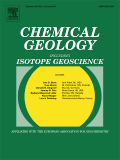
CHEMICAL GEOLOGY
Unveiling the Secrets of Earth Through Innovative ResearchChemical Geology is an esteemed international journal published by Elsevier, dedicated to the rigorous exploration of geochemistry and petrology, with its foundational roots tracing back to 1966. As evidenced by its impressive Q1 ranking in both Geochemistry and Petrology as well as Geology in the 2023 category quartiles, this journal stands as a premier outlet for cutting-edge research and innovative methodologies within these vital fields. With a Scopus rank placing it in the top 10% of Earth and Planetary Sciences, Chemical Geology offers a platform for researchers, professionals, and students alike to disseminate findings that advance our understanding of geological processes and materials. Although it does not currently offer open-access options, the journal remains committed to high-quality publications that contribute significantly to the scholarly community. Located in the vibrant academic milieu of Amsterdam, Netherlands, Chemical Geology is an essential resource for those engaged in the earth sciences, aiming to bridge theoretical insights with practical applications.
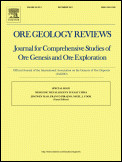
ORE GEOLOGY REVIEWS
Advancing the Frontiers of Ore GeologyORE GEOLOGY REVIEWS is a premier academic journal published by Elsevier, renowned for its influential contributions to the fields of Economic Geology, Geochemistry, and Petrology, and Geology. With its esteemed Q1 ranking across these disciplines in 2023, it occupies a leading position in shaping scholarly discussions and advancements within the geological sciences. With an impressive Scopus ranking—47th in Earth and Planetary Sciences for Geology, and among the top 40 in Geochemistry and Petrology—this journal serves as an essential resource for researchers, professionals, and students committed to advancing knowledge in ore geology. Having transitioned to an Open Access model in 2022, ORE GEOLOGY REVIEWS enhances the accessibility of high-quality research, promoting wider dissemination and engagement with cutting-edge findings from 1986 to 2024. As a valued publication addressing the intricacies of ore deposits and geochemical processes, it aims to foster interdisciplinary collaboration and innovation in the field.

Mineralogical Journal-Ukraine
Bridging knowledge and collaboration in mineral research.Mineralogical Journal-Ukraine is a key academic publication dedicated to advancing the field of mineralogy and geochemistry, under the esteemed auspices of the M.P. Semenenko Institute of Geochemistry, Mineralogy & Ore Formation of NAS Ukraine. Since its inception in 2019, this journal has established itself as an essential resource for researchers and professionals engaged in the study of energy, fuel technology, and the earth sciences, despite its present rankings reflecting a developing impact within these specific categories on Scopus. Published in Ukrainian and available in both print and online formats, the journal not only aims to disseminate high-quality research but also encourages inclusive access to vital findings in mineral exploration, petrology, and geochemical processes. With a commitment to excellence and an expanding scope of research, Mineralogical Journal-Ukraine stands as a pivotal platform for innovation and collaboration among scientists striving to understand the complexities of mineral formation and ore deposits.
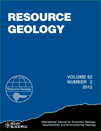
RESOURCE GEOLOGY
Elevating Geochemistry for Tomorrow's ChallengesRESOURCE GEOLOGY, published by WILEY, is a peer-reviewed journal that serves as a vital platform for the dissemination of innovative research in the fields of geology and geochemistry. With an ISSN of 1344-1698 and e-ISSN 1751-3928, the journal has steadily contributed to the academic community since its inception in 1996, continuing through its planned convergence in 2024. With a Q3 ranking in both Geochemistry and Petrology and Geology categories, RESOURCE GEOLOGY is positioned within the competitive landscape of Earth and Planetary Sciences, ranked 164th and 93rd in its respective categories on Scopus, reflecting its significant contribution to the body of knowledge in these fields. While not an open-access journal, it provides access to essential research that advances our understanding of natural resources and geological processes. The journal is dedicated to publishing high-quality articles that appeal to researchers, professionals, and students looking to deepen their insight into the intricate interplay between geological phenomena and resource management.
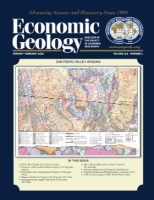
ECONOMIC GEOLOGY
Where Geoscience Meets Economic ImpactECONOMIC GEOLOGY, published by the Society of Economic Geologists, Inc., is a premier journal dedicated to the field of economic geology, geochemistry, petrology, geology, and geophysics. With a significant legacy dating back to 1905 and converging into 2024, this journal has established itself as a leading source of research and knowledge in the geosciences, recognized for its high-quality, peer-reviewed articles that reflect the latest advancements in the discipline. Having achieved an impressive impact factor and categorized in the top Q1 quartiles, it ranks among the foremost journals in various related fields, including Earth and Planetary Sciences—where it particularly excels in geophysics (Rank #5) and geochemistry (Rank #6). Although it currently does not offer open access options, its rigorous publication standards ensure that the research disseminated significantly contributes to the understanding and exploration of geological resources. This journal is essential reading for researchers, professionals, and students who seek to deepen their knowledge and stay at the forefront of economic geology.
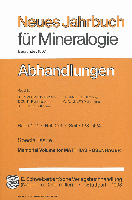
NEUES JAHRBUCH FUR MINERALOGIE-ABHANDLUNGEN
Illuminating the path of mineralogical discovery.NEUES JAHRBUCH FUR MINERALOGIE-ABHANDLUNGEN, published by E Schweizerbart'sche Verlagsbuchhandlung in Germany, is a distinguished scholarly journal dedicated to advancing the fields of mineralogy and petrology. With an ISSN of 0077-7757, it provides a platform for researchers to disseminate high-quality findings that contribute to our understanding of Earth sciences. Although it currently has no open access options, the journal remains vital for professionals seeking to engage with impactful research in geochemistry and petrology, as reflected in its 2023 Scopus ranking in the 21st percentile within its category. The journal has documented significant research from 1980 to 1988 and resumed from 1996 to 2023, making it a crucial archive for historical and contemporary studies. Despite its current Q4 quartile ranking, NEUES JAHRBUCH FUR MINERALOGIE-ABHANDLUNGEN is an important contributor to the academic discourse in its field, and it invites researchers, professionals, and students alike to explore and submit their work that drives innovation and understanding in mineralogical studies.
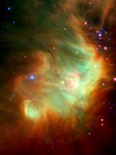
Annual Review of Earth and Planetary Sciences
Exploring the Frontiers of Earth and BeyondAnnual Review of Earth and Planetary Sciences is a leading scholarly journal published by Annual Reviews, dedicated to advancing our understanding of the dynamic processes governing the Earth and its celestial companions. With ISSN 0084-6597 and E-ISSN 1545-4495, this esteemed journal, established in 1976, has consistently provided comprehensive reviews that synthesize cutting-edge research across various disciplines, including astronomy, astrobiology, geology, and planetary science. Notably, the journal has achieved a remarkable position in the academic landscape, ranking in the Q1 quartile across multiple categories, including Astronomy and Astrophysics and Earth and Planetary Sciences, with Scopus rankings placing it at the forefront of these fields. The journal's commitment to facilitating open access to critical scientific advances, though not fully open, allows for maximum reach within the research community. Researchers, professionals, and students alike can benefit from the high-impact articles designed to foster collaboration and innovation within the fields of earth and planetary science.